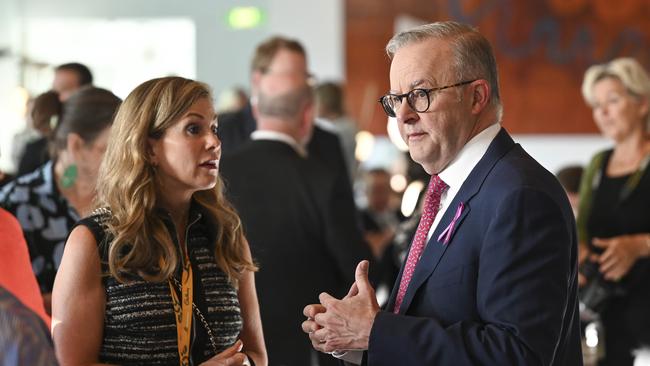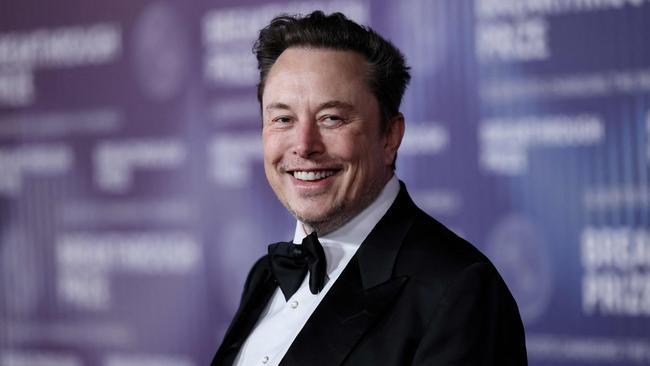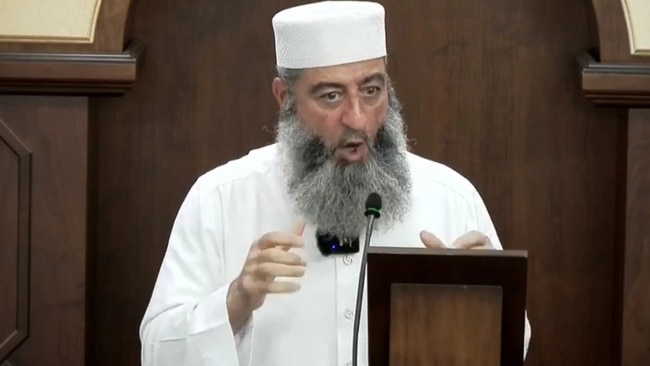
It took chutzpah for Albanese to raise “misinformation” and “disinformation” last week in defence of legal action by Australia’s eSafety Commissioner, Julie Inman Grant, against Musk.
She is a former executive at Twitter, now X.
The commissioner wants to force X to remove footage of an attack, allegedly by a 16-year-old boy, on an Assyrian bishop at Wakeley in western Sydney on April 15.
Albanese last Monday said: “This isn’t about freedom of expression. This is about the dangerous implications that can occur when things that are simply not true, that everyone knows are not true, are replicated and weaponised in order to cause division.”
Yet there is no suggestion the video of Bishop Mar Mari Emmanuel’s stabbing by a minor who cannot be named for legal reasons is “simply not true”.
The former chief of the ASPI (the Australian Strategic Policy Institute), Peter Jennings, was closer to the truth speaking with Chris Kenny on Sky News Australia on Wednesday night. Jennings blamed a decline in social cohesion in Australia on Labor’s policy of playing down the actions of Muslim protesters since Hamas’s massacre of 1200 innocent Israeli civilians on October 7.
Sermons by local Muslim imams celebrating that massacre and preaching hatred of Jews remain freely available on social media and news platforms.
While Albanese has often spoken against anti-Semitism and Islamophobia, he has never spoken against the outrageous anti-Israel demonstration at the Opera House on October 9, only two days after the worst massacre of Jews since the Holocaust.
Nor have politicians criticised the October 8 rally at Sydney’s Lakemba train station when Sheikh Ibrahim Dadoun told followers of the previous day’s obscenities: “I’m smiling. I’m happy. I’m elated. It’s a day of courage. It’s a day of pride, It’s a day of victory.”
Dadoun’s speech remains online.
No charges have been laid or take-down orders issued over a sermon on November 4 by Brother Ismail at the Al Madina Dawah Centre in southwestern Sydney. Ismail praises Hamas members as “freedom fighters”, calls for jihad by local Muslims and criticises any Muslims who have spoken against ISIS.

Another speaker at the same event, believed to be Abu Ousayd, who runs the centre, is shown on YouTube quoting scripture: “Towards the end of times, when the Muslims will be fighting the Jews, the trees will speak.
“They will say ‘oh Muslim, there is a yahud (Arabic for Jew) behind me, come and kill him’.”
Ditto a December 22 sermon by Ahmed Zoud at a Sydney mosque in which the imam shouts in Arabic that Jews are bloodthirsty, treacherous monsters.
His sermon mocks the civilian victims of October 7: “Those cowards collapsed in the face of the attacks by the mujahideen, and ran away from them like rats.”
We will have to wait until court proceedings to learn if the five young Muslim males arrested in raids in western Sydney last Wednesday were motivated by the Wakeley incident or by seven months of anti-Israel hate preaching. We know they shared ISIS beheading videos.
This is not to say the security agencies are wrong to worry the Wakeley footage could trigger copycat attacks. The 15-year-old male killer of Parramatta police employee Curtis Cheng in 2015 had been radicalised listening to extremist views. As was Numan Haider, an 18-year-old killed while attempting to stab two police officers in Melbourne in September 2014.
Neither is it in the interests of a fair trial for the accused for the unedited footage to be freely available.
Yet it is clear the federal government is tiptoeing around Muslim extremism, partly out of concern for social cohesion but also because of the large number of Muslim voters in Labor seats on the outskirts of Sydney and Melbourne.
This column has been briefed over three decades by ASIO bosses and police commissioners but still believes sunlight is a reliable disinfectant when trouble breeds in the darkness. The Australian was often attacked in left-wing media for its aggressive approach to national security reporting in the years after 9/11.

Then editor Clive Mathieson and I were slammed in late 2014, especially on the ABC, for publishing a photo from the Twitter account of now dead Sydney ISIS fighter Khaled Sharrouf showing he and his son holding a severed head with the caption from Sharrouf’s own social media account: “That’s my boy.” The son’s face was pixilated.
Tony Abbott, prime minister at the time, did not criticise The Australian for publishing a true image, but criticised ISIS for “seeking not just a terrorist enclave but effectively a terrorist state”. Media criticism here of the decision to publish died down the following day when both The Times in London and The New York Times published the same photo.
So is Musk right to defend publishing the Wakeley stabbing video? His lawyer, Marcus Hoyne, is surely correct to say that the video has already spread globally beyond the URLs targeted by Inman Grant.
The video is on many platforms, including Facebook, and has been shown regularly here on free-to-air television. Hoyne on Wednesday produced a statement from Bishop Emmanuel saying he believed the video should not be taken down.
None of this seems to be worrying one of the world’s richest men. Musk was bragging last week that Albanese had done X a favour: it is now our fastest growing social media platform.
X, far less left-wing under Musk than when it was Twitter, is out of favour with journalists who preferred the original product.
Yet whatever reporters think about X, the government’s rhetorical case against Musk relies on a confused understanding of what AFP Commissioner Reece Kershaw and ASIO chief Mike Burgess were discussing at the National Press Club last Wednesday.
Sure they want more co-operation from people like Musk and Meta CEO Mark Zuckerberg. But their real concern is end-to-end encryption and the rise of AI, both of which allow criminals and would-be terrorists to have anonymity. They want the platforms to co-operate in exposing illegality.
X is an open platform relying on public commentary. It is not a vehicle for private communication between criminals.
That does not mean publication of certain videos on X might not radicalise young minds. Indeed, the Christchurch killer who massacred 51 people in attacks on two mosques in 2019 had posted his entire anti-immigration hate manifesto on Twitter the day before.
It’s just that criminals and terrorists are much more likely to use platforms such as Telegram, WhatsApp, Signal, Flickr, Vimeo, Instagram and SoundCloud. More open channels for sharing radical ideas include Facebook and YouTube.
Often young people flirting with radical ideas are directed online to messaging apps and forums such as 4chan, 8chan or 8kun.
Inman Grant on Wednesday won an extension in the Federal Court in Sydney of Justice Kennett’s temporary take-down order last Monday until a full hearing on May 10.
Whatever that decides, Musk’s criticism that Inman Grant and Albanese think they can control global content under a law in Australia is correct.








Anthony Albanese’s war on Elon Musk, owner of social media platform X, is low politics but might just divert Australians’ attention away from his government’s national security failures.